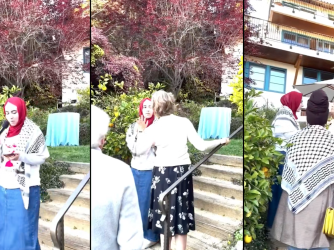Table of Contents
As New Lawsuit Alleges Racial Discrimination in Campus Sexual Assault Proceedings, ‘Hunting Ground’ Producers Continue to Blame Film’s Criticism on ‘Threat’ to ‘White Male Power’

Amy Ziering, one of the producers of The Hunting Ground—a film that purports to shed light on the issue of campus sexual assault—recently said that the backlash against her film owes to the fact that it poses “a threat to the dominant white male power.” Part of that backlash, according to Ziering, was the “crazy reaction” from Harvard Law School professors like Jeannie Suk and Janet Halley, who were among the signatories to a press release that blasted the film’s portrayal of Harvard Law student Brandon Winston and called the film “propaganda.”
In accusing these professors of acting in defense of “white male power,” Ms. Ziering strangely ignores the fact that Brandon Winston is black.
If we are to believe the filmmakers, the issue of campus rape is really one of “a white, middle-class or upper-class, privileged male population,” right? Wrong. In her calls for reforming Harvard’s sexual misconduct procedures, Harvard Law professor Janet Halley has noted that “[c]ase after Harvard case that has come to my attention, including several in which I have played some advocacy or adjudication role, has involved black male respondents.” Indeed, over the last four years, at least 13 lawsuits have been filed by black men against universities across the country alleging that they were denied fundamental fairness in campus sexual assault proceedings.
In the most recent of these lawsuits, Browning v. University of Findlay, two black male students expelled without a hearing from the University of Findlay, a private institution in Ohio, allege not only that they were subject to manifestly unfair disciplinary proceedings, but also that the university discriminated against them on the basis of race. According to the students’ complaint, “[t]he University of Findlay has a history of discriminating against African-American males in allegations of sexual assault by Caucasian females.”
The allegations in the lawsuit are shocking. The students allege not only that they received no hearing, but that the Title IX investigator never even interviewed the complaining student, instead accepting the facts from her initial report of the alleged assault. When the accused students were interviewed, they allege, they were not given any specific details about the allegations against them, nor were they informed of their right, under university policy, to have an advisor present. The students allege that racial bias affected the university’s investigation process at various stages, including the investigator’s choice of witnesses to interview as well as the investigator’s decision not to interview the students’ (Caucasian) accuser.
Moreover, they allege that after they were expelled, the university sent an email to the entire university community about the alleged assault, identifying the students by name and stating that they had been expelled. An article from The Toledo Blade published just three days after the students’ expulsion seems to corroborate many of their allegations, including the university’s release of their names:
Dave Emsweller, vice president for student affairs, said the university on Friday dismissed basketball player Alphonso Baity and football player Justin Browning. … A university investigative group interviewed the accused students and witnesses Thursday and “reached a conclusion that there was a preponderance of evidence that suggested there was a sexual assault,” he said.
As I have noted before, it is distressing that so many people who otherwise seem to care about justice and fairness have developed such a blind spot when it comes to the rights of those accused of sexual assault on campus.
And it goes without saying that anyone peddling the narrative that only privileged white frat boys get accused of sexual assault on campus is not only peddling a falsehood, but also actively undermining the fundamental rights of all college students. Due process protections exist to reduce the chance that bias and prejudice, of whatever kind, will affect the outcome of a proceeding. When due process is ignored or reduced, those against whom bias or prejudice is most likely to be directed are the ones who bear the brunt.
Recent Articles
FIRE’s award-winning Newsdesk covers the free speech news you need to stay informed.

Salman Rushdie calls out left-wing censorship in CBS interview

Western Washington University punishes racing team for sending a photo of a penis drawing on a pizza box

No, the Berkeley Law student didn’t have a First Amendment right to interrupt the dean’s backyard party
